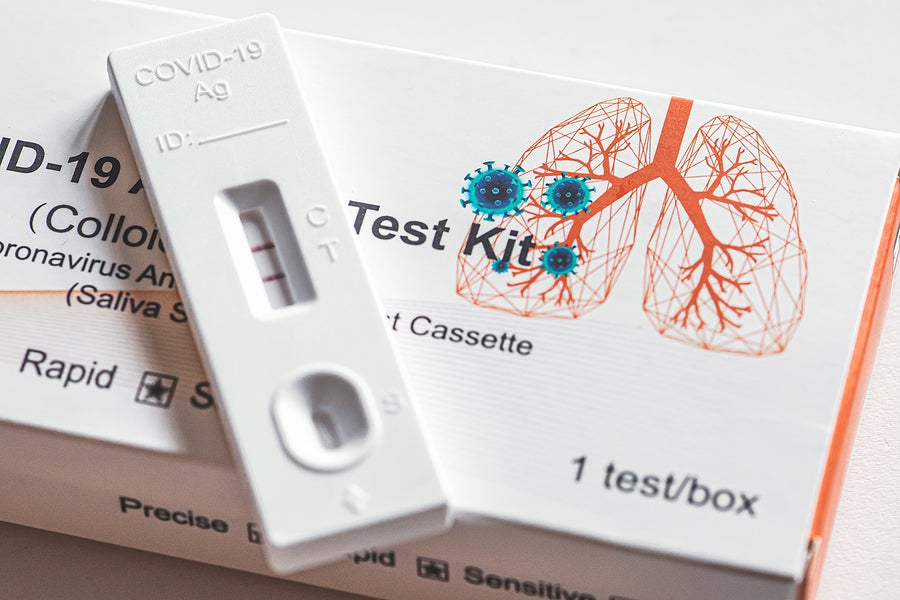As the Kaiser Family Foundation (KFF) recently explained, state Medicaid and CHIP programs are required to cover at-home COVID-19 rapid tests, without cost-sharing, until at least one year after the end of the COVID-19 public health emergency. However, there seems to be substantial variation across state Medicaid and CHIP programs in how they actually cover rapid tests. In addition, there appears to be no or little national and state-level outreach and education about the availability of such coverage for rapid tests.
The American Rescue Plan Act of 2021 built on earlier Medicaid and CHIP testing and treatment requirements enacted in the Families First Coronavirus Response Act of 2020 to require state Medicaid programs to cover COVID-19 testing, treatment, and vaccines, without cost-sharing. The requirement is in effect through the end of the last calendar year quarter that begins one year after the end of the COVID-19 public health emergency. Guidance from the Centers for Medicare and Medicaid Services (CMS) subsequently clarified in August 2021 that state Medicaid and CHIP programs must specifically cover “‘point of care’ or ‘home’ tests that have been provided to a Medicaid and CHIP beneficiary by a qualified Medicaid or CHIP provider of COVID-19 tests.” This includes at-home rapid tests “that are entirely performed at home, meaning the test systems includes the ability to perform the test without involvement of a laboratory.”
Unfortunately, the CMS guidance also permitted states to impose limitations on at-home rapid test coverage, including requiring a prescription, although CMS encouraged states to refrain from establishing arbitrary access barriers. (States must still establish that a covered test is tied to an individual Medicaid or CHIP beneficiary.) The guidance also did not require a minimum number of tests to be covered each month. As a result, there is no uniformity in how states are currently covering at-home rapid tests through Medicaid and CHIP.
For example, according to KFF, which examined the policies of a few state Medicaid programs, some states do not require a prescription and will cover over-the-counter rapid tests provided by Medicaid pharmacies. The state of New York, however, initially covered rapid tests only if they were ordered by a Medicaid provider (although it has subsequently lifted that requirement). In addition, quantity limits vary. North Carolina covers a maximum of four test kits every 30 days. Massachusetts covers eight tests per month (but will cover additional tests with prior authorization). New York initially covered one test kit per week (but now covers up to 8 per month, with additional tests allowed with a “fiscal order”.)
This is in contrast to the new CMS policy, announced on February 3, 2022, that Medicare will cover 8 over-the-counter, at-home rapid tests per beneficiary per month, without cost-sharing, starting this spring. The Department of Health and Human Services similarly required last month that private insurers cover eight, over-the-counter rapid tests per member per month.
To better ensure access to at-home rapid tests for Medicaid and CHIP beneficiaries, CMS should immediately revise its earlier guidance. CMS should clarify that all state Medicaid and CHIP programs must cover at-home rapid tests over-the-counter (that is, without a prescription). It also should set a minimum quantity amount, such as 8 rapid tests per beneficiary per month. That would be consistent with the requirements for private insurers and Medicare. CMS should also require that states allow coverage of additional tests (with prior authorization).
In addition, CMS should undertake a national outreach and education effort to promote awareness about the availability of Medicaid coverage of rapid tests (including partnerships with pharmacies and other health care providers). It also should encourage states to undertake their own outreach and education efforts and provide any needed technical assistance to states as well.
It is clear that at-home rapid tests are a key tool in addressing the COVID-19 pandemic. The Biden Administration and the states should better ensure that tens of millions of low-income Medicaid beneficiaries have access to such tests moving forward.


